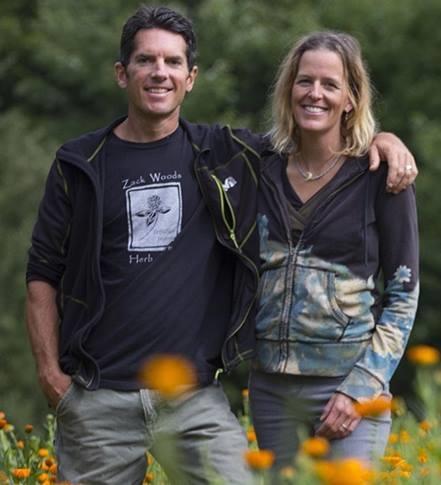Posted March 17, 2022 at 10:36am by Anonymous (not verified)
Herb Production Ramps Up

Written by Kate Stephenson
Zack Woods Herb Farm grows a wide variety of medicinal herbs sold as dried herbs, live plants and fresh herbs. Based in Hyde Park, their products are all certified organically grown or ethically wild-harvested on the farm. After 16 years in business, Jeff and Melanie Carpenter recently authored a book published by Chelsea Green titled “The Organic Medicinal Herb Farmer” as well as spearheaded the creation of the Vermont Herb Growers Cooperative to offer certified organic, Vermont-grown medicinal herbs on a commercial/wholesale scale. Jeff and Melanie have been working collaboratively with the Vermont Herb Growers Cooperative to design a “batch dryer” to increase the efficiency of herb drying while also retaining a higher percentage of the medicinal oils in the herbs they process. This project supports Farm to Plate food system plan goals to minimize fossil fuel use and reduce production expenses.
Responding to Increased Demand
As Jeff and Melanie ramped up their production, they began to see the potential for selling more products on the wholesale market, yet they knew that due to increasing scrutiny from the FDA, more testing for microbiological contamination like yeast, mold spores, and other fungi was critical. With their new batch dryer they can dry the herbs faster, increase capacity and efficiency, and mitigate the potential for fungal contamination. They were also tired of having to get up in the middle of the night to stoke the wood fired dryers, and spent many hours laying each batch of herbs out in a single layer on trays.
Prototyping and Sharing Results
They worked with Chris Callahan, an agricultural engineer from UVM Extension, to hold a design workshop with four other members of the Vermont Herb Growers Cooperative. This allowed Zack Woods to minimize the cost of construction, and also allowed each of the farms to build slightly modified versions of the batch dryers. Each farm is sharing the information they learn to inform others who are interested in building similar dryers, and the focus is on ease of construction and affordability.
The Technology
The Carpenter’s batch dryer is heated by a 400,000 BTU propane heater which is ducted to direct heat into 3 connected, modular 8’x8’ bins. The goal is to dry leaf crops in 12-24 hours, and root crops in 24-36 hours, approximately half their previous drying time. The labor required to load the bins is also significantly reduced, as the truck can back up and deliver product directly into the bins, instead of having to spread the herbs out on trays manually. In the past, they dried all their herbs in a modified hoop house using passive solar and wood heat, but found it labor intensive to keep the wood-fired furnaces stoked continuously throughout the nights.
Finding Funding
Jeff and Melanie applied for a $30,000 Business Builder loan from the Vermont Farm Fund to cover the costs of designing and building one of the first prototype batch dryers. The Vermont Farm Fund’s Business Builder Loan program supports Vermont farms and food producers and those who directly support the growing of the VT food system. The loans are for businesses to invest and innovate for growth, increasing the availability of local foods in Vermont. The Vermont Farm Fund focuses on small and midscale producers that are trying to build their businesses, and larger enterprises that are working on smaller, innovative projects and pilot business ventures.
Results
Now, by electronically controlling airflow, humidity and temperature, and reducing UV exposure, quality increases, drying time is reduced, and more essential oils and other valuable medicinal compounds are retained in the herbs.
The new batch dryer will allow Jeff and Melanie to increase dehydration capacity and efficiency while preserving the valuable medicinal compounds in the herbs they grow. And they will be sharing what they’ve learned from the design and construction process to help other farmers develop similar low-cost systems.
Visit the Vermont Farm Fund website at www.vermontfarmfund.org to learn more about how their innovative low and no interest loans help Vermont farmers and food producers.
